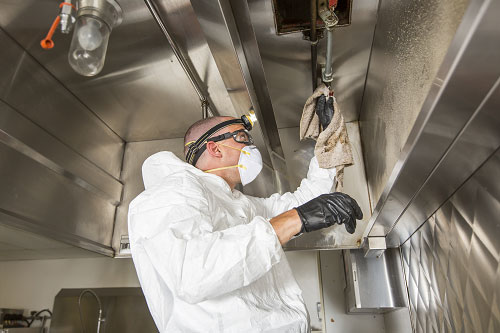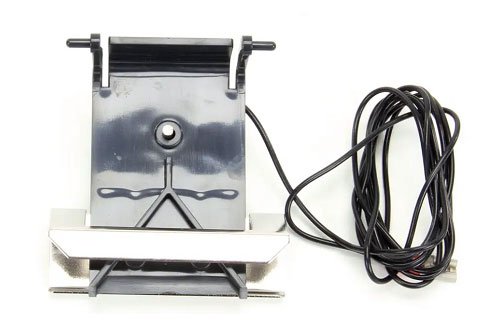During food safety month, many restaurants and commercial businesses receive materials on how they can make their kitchens safe. Everything from sanitation guides to food prep videos are tailored to help enhance their practices. But operators aren't the only ones who can help. Food service companies also can play a vital role in keeping kitchens clean and safe. Below are a few ways service companies and technicians can help customers keep their commercial kitchens safe and sanitary.
Offer Cleaning Packages
 Deep cleanings by the pros ensure correct OEM cleaners and sanitizers are used on equipment.
Deep cleanings by the pros ensure correct OEM cleaners and sanitizers are used on equipment.
We know what you're thinking. Yes, operators are supposed clean their equipment routinely. However, in most cases, the manufacturer only requires a quick wipe down with soft soap and warm water. Equipment like ice machines, combi ovens, fryers and beverage dispensers require deep cleaning and sanitizing every quarter or six months. A full-scale cleaning with OEM-approved chemicals and sanitizers not only helps prolongs the lifespan of the equipment, but it also ensures the certain contaminants and food remnants are completely eradicated.
While solo packages on one unit help, consider offering options that include multiple pieces of equipment. When your technicians are on the job repairing machines or conducting routine maintenance, have them identify other areas of the kitchen that need to be cleaned. If the kitchen has multiple brands that are part of your agency, you can offer to roll them into one cleaning package since your technicians are familiar with the equipment.
Change Water Filters
From making ice and beverages to steam cooking and washing ingredients during prep, water is key in a commercial kitchen. To ensure your customers have water that is safe and maintains brand integrity, your service company can offer planned maintenance to install or swap out filters every six months (or sooner in areas with hard water). Water filters help remove harmful particles and sediment, which not only protects equipment and plumbing from damage but also ensures a business isn't preparing food in or serving unsanitary water.
There are many types of commercial water filters you can use on different kitchen equipment. For instance, combing carbon and ion-exchange filters helps eliminate dust, mold spores and iron. Iron is main cause of slime or bacterial buildup, so this combination of filters comes in handy on ice machines, dishwashers and beverage dispensers.
Meanwhile, reverse osmosis (RO) filters are best used in steam and combi ovens as well as coffee machines to help reduce major scale buildup and excess chlorides from entering food and drinking water. In some cases, you might have to conduct water tests or partner with a filtration supplier for help testing. This will help you determine the best filters based on the facility's water quality.
Use OEM Parts
 OEM parts, including ice thickness probes, are tested to ensure product is safe to consume.
OEM parts, including ice thickness probes, are tested to ensure product is safe to consume.
From preventative maintenance tasks to large repairs, technicians sometimes have to make the call to replace parts on commercial kitchen equipment. While generic and OCM parts might seem the same, OEM parts play a key role in keep equipment and food product safe. One key difference is that equipment manufacturers have their OEM parts tested by the National Sanitation Foundation (NSF). NSF reviews components that come into direct contact with food or water, checking that they're not only electrically safe but also sanitary under U.S. Food and Drug Administration (FDA) requirements.
For example, an OEM ice thickness probe is tested to ensure it doesn't contain high lead concentration. Since there is no guarantee that generic or OCM counterparts undergo NSF testing, there is a chance traces of lead could make their way into the water or ice cubes when the thickness probe starts eroding. That is a risk restaurants and other commercial kitchens can't take.
The same is true when it comes to PFTE baking sheets on select cooking equipment. It's crucial that when your technicians are conducting maintenance on these machines that they stick with the OEM PFTE sheets. These are rigorously tested to ensure they operate in the equipment for 30-90 days at high temperatures. While some generic and OCM versions are locally sourced and can be bought cheaply in bulk, these sheets can wear down and make they're way into food, making product no longer safe to consume.
Conclusion
These are just a few easy ways you can help keep restaurant and commercial kitchen spaces clean and safe. By offering these services, your company can increase its profile and become a trusted source when it comes to food and kitchen safety measures. Remember that the industry is always changing. To keep up with the latest standards and best practices, check out the latest resources from organizations like NSF, ServSafe, The Joint Commission and EcoLab.



